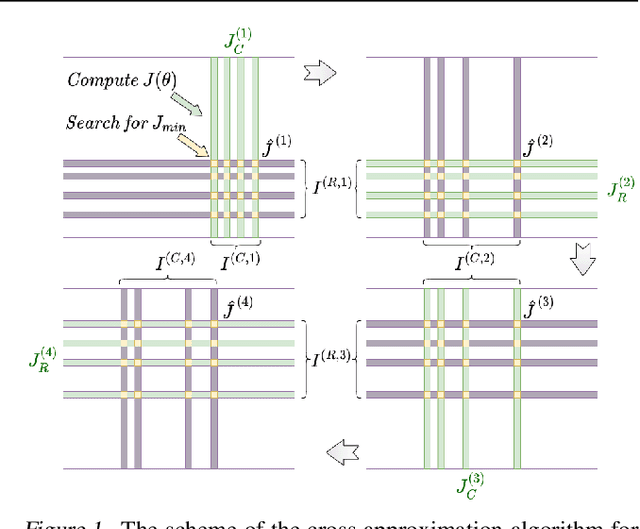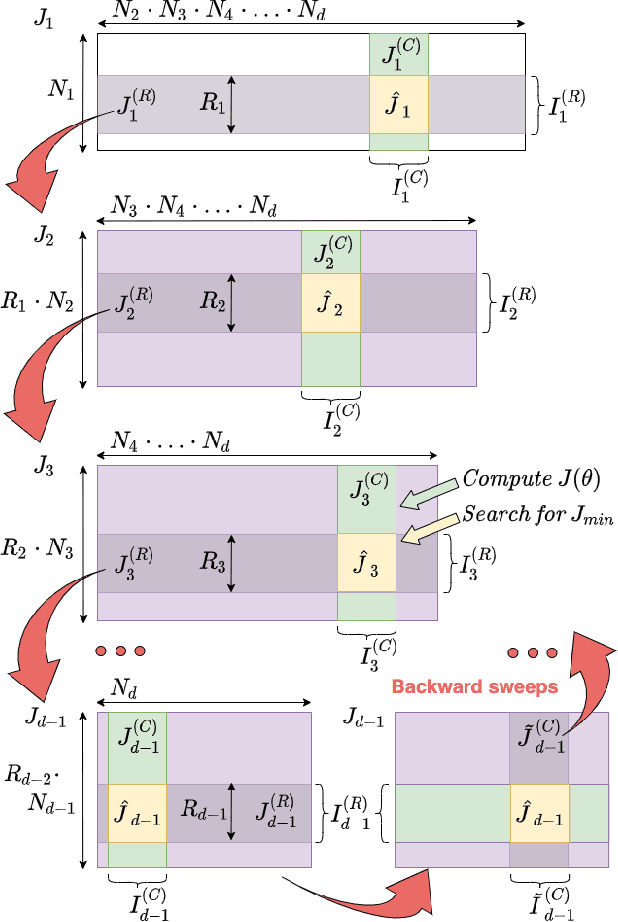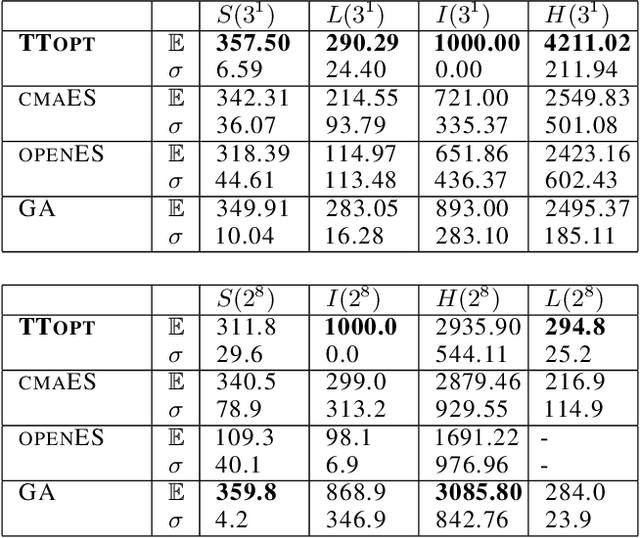Andrei Chertkov
Global Optimization of Atomic Clusters via Physically-Constrained Tensor Train Decomposition
Jan 26, 2026Abstract:The global optimization of atomic clusters represents a fundamental challenge in computational chemistry and materials science due to the exponential growth of local minima with system size (i.e., the curse of dimensionality). We introduce a novel framework that overcomes this limitation by exploiting the low-rank structure of potential energy surfaces through Tensor Train (TT) decomposition. Our approach combines two complementary TT-based strategies: the algebraic TTOpt method, which utilizes maximum volume sampling, and the probabilistic PROTES method, which employs generative sampling. A key innovation is the development of physically-constrained encoding schemes that incorporate molecular constraints directly into the discretization process. We demonstrate the efficacy of our method by identifying global minima of Lennard-Jones clusters containing up to 45 atoms. Furthermore, we establish its practical applicability to real-world systems by optimizing 20-atom carbon clusters using a machine-learned Moment Tensor Potential, achieving geometries consistent with quantum-accurate simulations. This work establishes TT-decomposition as a powerful tool for molecular structure prediction and provides a general framework adaptable to a wide range of high-dimensional optimization problems in computational material science.
Low-rank surrogate modeling and stochastic zero-order optimization for training of neural networks with black-box layers
Sep 18, 2025Abstract:The growing demand for energy-efficient, high-performance AI systems has led to increased attention on alternative computing platforms (e.g., photonic, neuromorphic) due to their potential to accelerate learning and inference. However, integrating such physical components into deep learning pipelines remains challenging, as physical devices often offer limited expressiveness, and their non-differentiable nature renders on-device backpropagation difficult or infeasible. This motivates the development of hybrid architectures that combine digital neural networks with reconfigurable physical layers, which effectively behave as black boxes. In this work, we present a framework for the end-to-end training of such hybrid networks. This framework integrates stochastic zeroth-order optimization for updating the physical layer's internal parameters with a dynamic low-rank surrogate model that enables gradient propagation through the physical layer. A key component of our approach is the implicit projector-splitting integrator algorithm, which updates the lightweight surrogate model after each forward pass with minimal hardware queries, thereby avoiding costly full matrix reconstruction. We demonstrate our method across diverse deep learning tasks, including: computer vision, audio classification, and language modeling. Notably, across all modalities, the proposed approach achieves near-digital baseline accuracy and consistently enables effective end-to-end training of hybrid models incorporating various non-differentiable physical components (spatial light modulators, microring resonators, and Mach-Zehnder interferometers). This work bridges hardware-aware deep learning and gradient-free optimization, thereby offering a practical pathway for integrating non-differentiable physical components into scalable, end-to-end trainable AI systems.
Faster Language Models with Better Multi-Token Prediction Using Tensor Decomposition
Oct 23, 2024Abstract:We propose a new model for multi-token prediction in transformers, aiming to enhance sampling efficiency without compromising accuracy. Motivated by recent work that predicts the probabilities of subsequent tokens using multiple heads, we connect this approach to rank-$1$ canonical tensor decomposition. By generalizing it to a rank-$r$ canonical probability decomposition, we develop an improved model that predicts multiple tokens simultaneously. This model can also be interpreted as a mixture of experts, allowing us to leverage successful techniques from that domain for efficient and robust training. Importantly, the overall overhead for training and sampling remains low. Our method demonstrates significant improvements in inference speed for both text and code generation tasks, proving particularly beneficial within the self-speculative decoding paradigm. It maintains its effectiveness across various model sizes and training epochs, highlighting its robustness and scalability.
Black-Box Approximation and Optimization with Hierarchical Tucker Decomposition
Feb 05, 2024



Abstract:We develop a new method HTBB for the multidimensional black-box approximation and gradient-free optimization, which is based on the low-rank hierarchical Tucker decomposition with the use of the MaxVol indices selection procedure. Numerical experiments for 14 complex model problems demonstrate the robustness of the proposed method for dimensions up to 1000, while it shows significantly more accurate results than classical gradient-free optimization methods, as well as approximation and optimization methods based on the popular tensor train decomposition, which represents a simpler case of a tensor network.
Translate your gibberish: black-box adversarial attack on machine translation systems
Mar 20, 2023Abstract:Neural networks are deployed widely in natural language processing tasks on the industrial scale, and perhaps the most often they are used as compounds of automatic machine translation systems. In this work, we present a simple approach to fool state-of-the-art machine translation tools in the task of translation from Russian to English and vice versa. Using a novel black-box gradient-free tensor-based optimizer, we show that many online translation tools, such as Google, DeepL, and Yandex, may both produce wrong or offensive translations for nonsensical adversarial input queries and refuse to translate seemingly benign input phrases. This vulnerability may interfere with understanding a new language and simply worsen the user's experience while using machine translation systems, and, hence, additional improvements of these tools are required to establish better translation.
Are Quantum Computers Practical Yet? A Case for Feature Selection in Recommender Systems using Tensor Networks
May 12, 2022



Abstract:Collaborative filtering models generally perform better than content-based filtering models and do not require careful feature engineering. However, in the cold-start scenario collaborative information may be scarce or even unavailable, whereas the content information may be abundant, but also noisy and expensive to acquire. Thus, selection of particular features that improve cold-start recommendations becomes an important and non-trivial task. In the recent approach by Nembrini et al., the feature selection is driven by the correlational compatibility between collaborative and content-based models. The problem is formulated as a Quadratic Unconstrained Binary Optimization (QUBO) which, due to its NP-hard complexity, is solved using Quantum Annealing on a quantum computer provided by D-Wave. Inspired by the reported results, we contend the idea that current quantum annealers are superior for this problem and instead focus on classical algorithms. In particular, we tackle QUBO via TTOpt, a recently proposed black-box optimizer based on tensor networks and multilinear algebra. We show the computational feasibility of this method for large problems with thousands of features, and empirically demonstrate that the solutions found are comparable to the ones obtained with D-Wave across all examined datasets.
TTOpt: A Maximum Volume Quantized Tensor Train-based Optimization and its Application to Reinforcement Learning
Apr 30, 2022



Abstract:We present a novel procedure for optimization based on the combination of efficient quantized tensor train representation and a generalized maximum matrix volume principle. We demonstrate the applicability of the new Tensor Train Optimizer (TTOpt) method for various tasks, ranging from minimization of multidimensional functions to reinforcement learning. Our algorithm compares favorably to popular evolutionary-based methods and outperforms them by the number of function evaluations or execution time, often by a significant margin.
 Add to Chrome
Add to Chrome Add to Firefox
Add to Firefox Add to Edge
Add to Edge